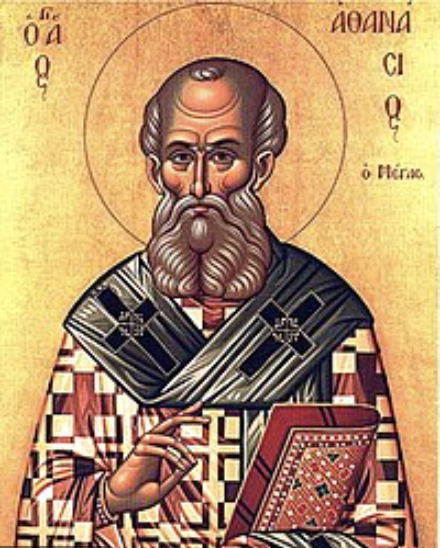By: Michelle Johnson I December 30, 2020
Last week, listeners to the Bellator Christi podcast heard Brian and Curtis discuss Athanasius’ writing – On the Incarnation of the Word of God. (Bellator Christi Podcast 12.23.2020) If you haven’t had a chance to hear their conversation, head on over to the podcast and take a listen. As a student of church history, a few questions begin to pop into my head. Who is Athanasius? Where and when did he live and work? Why is he significant in church history? Was the incarnation of Jesus the main focus of his efforts?
Let’s get to know Athanasius by exploring answers to some of these questions. Most sources agree, Athanasius was born in (or close to) the year 298. The exact location of his birthplace isn’t exactly clear, but Athanasius was educated, lived and worked in the city of Alexandria, Egypt. Alexandria was founded by Alexander the Great, some 600 years before Athanasius lived there. It was, and still is a busy, seaport city that lies on the northern coast of Egypt along the Mediterranean Sea. Alexandria was a wealthy and influential city, home to a significant library and considered a center of learning in the ancient world. Such is the city in which we find Athanasius.
Most biographical accounts of Athanasius’ life begin when he was in his twenties. Not much information about his childhood and youth seems to exist. Johannes Quasten suggests his education was “classic and theological”. (Patrology Vol 3 p20) By the time Athanasius was in his mid-twenties he had been ordained by bishop Alexander as a deacon in the church.
There was controversy rising within the church and a conflict between the views of a priest named Arius and bishop Alexander. These two were at odds over the nature of Christ. Arius had believed and taught that Jesus Christ was a created being and therefore not God (a position that became known as Arianism). Alexander, on the other hand, understood scripture to say Jesus Christ was indeed, fully God. The debate had been brewing in Alexandria and eventually caught the attention of emperor Constantine. Constantine was favorable to Christianity, having issued the Edict of Milan in 313 which gave Christianity a tolerated status within the Roman Empire. Constantine, like many of the other emperors were interested in maintaining peace throughout their realm. Fearing an issue that would cause division within Christianity, Constantine called the first ecumenical council, to take place in the city of Nicaea. This was a gathering of theologians and church leaders from around the empire that would hear the arguments on both sides and determine which one was right. Arius and Alexander went to Nicaea to present their cases.
It is common to look back to the Council of Nicaea and see it dominated by Athanasius. While he does become a major player in this debate, initially he attended the council as the secretary to bishop Alexander. The debate was between Alexander and Arius. The council sided with Alexander and established as its official position – Jesus was indeed divine. Arianism was determined to be a heretical belief. This however was not the end of the debate. Arianism continued to spread within the church. Just three short years after the Council of Nicaea bishop Alexander died. Athanasius succeeded him as bishop as well as defender against Arianism.
Athanasius would serve as bishop of Alexandria for the next 45 years. However, his tenure would not be without significant difficulty. He would be exiled no less than five times for a total of 17+ years. His first challenge occurred in 335. Emperor Constantine requested Arius be accepted back into communion with the church, after being declared a heretic by the council. Athanasius refused and was exiled by Constantine. Exile number two came in 339 and wasn’t fully resolved until 346.
One of Constantine’s sons, Constantius, now ruling as emperor was responsible for exiling Athanasius for the third time. This time Athanasius remained exiled until Constantius’ death. He sought refuge with monks and individuals who had established a thriving and quite popular monastic lifestyle in the desert of Egypt. Saint Antony, possibly one of the founders of this movement, would become the subject of a biography written later by Athanasius. This particular writing would become significant for the monastic movement.
Athanasius once again returned to Alexandria. Constantius had died and the new emperor Julian recalled the exiled Athanasius back to his position. This was to be short lived, however, as Athanasius found himself at odds with Julian and back in exile (#4) within the year. The death of Julian brought Athanasius back once again to Alexandria.
The new emperor Valens exiled Athanasius for a fifth and final time. This exile didn’t last as there were those that expressed their displeasure to Valens over this decision and Athanasius was recalled back to Alexandria. Thus, as bishop of Alexandria, Athanasius found himself in a constant state of back and forth. Following this fifth and final exile, Athanasius was allowed to function as bishop for the last seven years of his life. (exile timeline found in Patrology Vol 3 p 20-22)
The podcast conversation centered upon one particular writing of Athanasius that addressed the incarnation. Did he write anything else? Yes! Athanasius wrote a number of things. He used his writing to continue the argument against Arianism. He wrote in defense of monotheism and he explained his understanding of biblical redemption and countered the beliefs of pagans in yet other writings. The monastic life and the example set by St. Antony occupied at least one book. We have letters written by Athanasius.
Athanasius is probably most noted for his involvement in the Arian controversy. His position of prominence in this debate really came after the council of Nicaea’s decision, when he became the bishop. Because of Arianism’s continued proliferation, Athanasius would take up the mantle of champion of the deity of Christ. This issue would continue beyond his lifetime. The Cappadocian Fathers – Basil the Great, Gregory of Nyssa and Gregory of Nazianzus would follow in his footsteps as the debate expanded to include discussion about the divinity of the Holy Spirit. The decisions made at the council of Constantinople in 381, eight years after Athanasius’ death, would finally bring closure. The significance of the work of these two councils – Nicaea and Constantinople – are at the core of what we, as believers confess today, belief in the triune God – one God, three persons – God the Father, God the Son and God the Holy Spirit.
So here we have Athanasius, certainly a significant individual in the history of the church. To study his life gives one the opportunity to witness how key doctrinal decisions came about within the early church. It is impossible to know about Athanasius and not be challenged to examine what scripture says about exactly who Jesus Christ is and no better time than the Christmas season to consider the incarnation of God Himself and what that means for each of us. If you haven’t checked out last week’s podcast, I’d encourage you to do so. Merry Christmas and Happy New Year.
Sources
Elwell, Walter A., ed. Evangelical Dictionary of Theology. 2nd ed. Baker Reference Library. Grand Rapids, MI: Carlisle, Cumbria, U.K: Baker Academic; Paternoster Press, 2001.
Quasten, Johannes. Patrology: The Golden Age of Greek Patristic Literature. Volume 3. Westminster, MD: Christian Classics, 1990.
About the Author
Michelle Johnson earned her M.A. in Theological Studies and her M.Div. in Professional Ministries at Liberty University, where she is also working on her Ph.D. in Theology and Apologetics. Michelle is also a graduate of the University of Minnesota. She and her husband Steve live in Mankato, Minnesota, where she also serves in women’s ministry. In addition to a love of theology, apologetics, and church history, Michelle also has a passion for creationism studies. When she is not spending time reading or writing, Michelle can often be found dreaming of her next travel adventure or enjoying a great cup of coffee.





